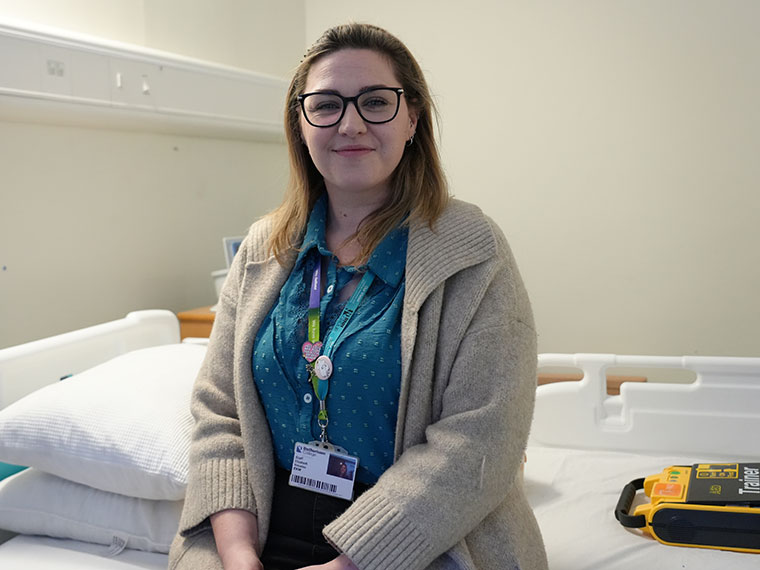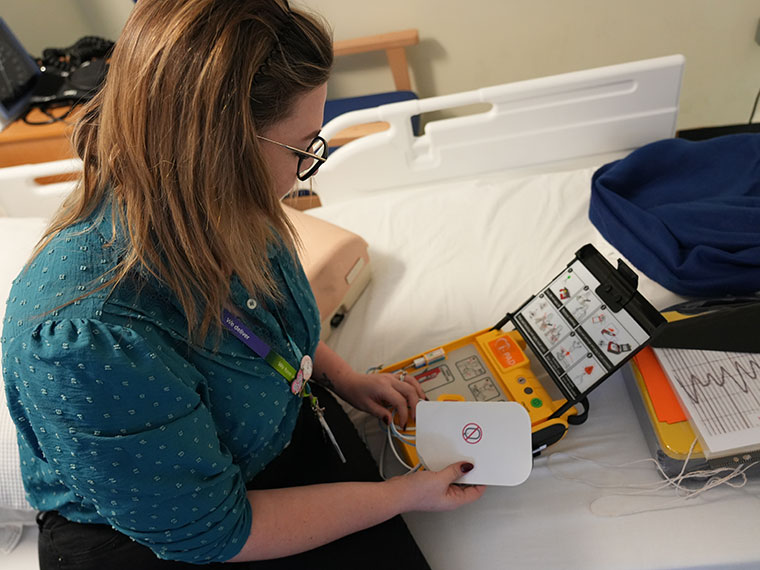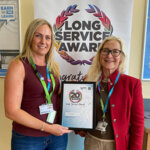Student Spotlight: Meet Lizzie, a health and social care degree graduate from University Centre Rotherham
Faces of University Centre Rotherham: Elizabeth Knowles, graduated from the caring professions department in 2024.
When Lizzie Knowles turned 30, it wasn’t mountains she was interested in climbing – it was the career ladder.
After spending a decade working in adult social care, all while raising two young children, she decided it was time for a new chapter in her career.
So instead of jumping out of a plane for her birthday, she jumped back into education, enrolling on the Foundation Degree in Professional Practice in Health and Social Care at University Centre Rotherham.
Now, after graduating earlier this year, she’s thriving in her role as an Education, Health and Care Plan (EHCP) Co-ordinator at University Centre Rotherham’s sister site, Rotherham College, using both her professional experience and personal insight to make a difference in the lives of our learners and their families.
Lizzie’s journey into higher education
Making the decision to return to study after several years in the workplace was both exciting and daunting for Lizzie.
She’d worked in adult social care since she was 20, first in local authority services and then a private day care centre. However, she wanted to move her career up a level but, although she had plenty of experience, needed a higher education qualification to reach that next band.
“When I got to 30, I decided to just go for it,” she says. “I have ADHD so it was a bit of an impulse decision and I did struggle to get back into academia after so long away from the classroom.”
But with encouragement from family and support from her tutors, Lizzie quickly rediscovered her love of learning.
Why Lizzie chose University Centre Rotherham
For Lizzie, choosing where to study was as important as deciding what to study. She wanted a course that was close to home and flexible enough to fit around her family commitments – and University Centre Rotherham offered exactly that.
“I’m a mum of two boys and the youngest was only one when I applied, so it had to be within arm’s reach for me,” she says. “University Centre Rotherham gave me a chance to study on my doorstep. The course was accredited by Sheffield Hallam University so I knew I would be getting a quality education without having to commute into Sheffield.”
For the foundation degree, Lizzie was only in university one-and-a-half days a week which meant she didn’t have to sacrifice family time or dropping her eldest son off at school.
“It wasn’t always easy and I remember doing night feeds while writing assignments. But it was also great to see my oldest so interested in what I was learning at ‘school’ each week. We did a module on anatomy and biology and he was fascinated by it – he became my little study buddy.”

Academic life
The foundation degree, which is now called Assistant Practitioner in Health and Social Care, is taught over two years with a mix of group work, presentations, and assessments.
It’s mainly aimed at people like Lizzie who are already working in health and social care but are looking to gain the higher qualifications needed to enhance their career prospects.
Through her studies, Lizzie developed a deeper understanding of health and social care systems, policies, and professional practice. Modules covering safeguarding, inclusive support, and multi-agency collaboration gave her both the theoretical insight and the practical skills needed for career advancement.
“A lot of the theory work I still use now as it’s more relevant to my job than ever. The biopsychosocial model I will take to my grave as it’s ingrained in my brain. The research modules were the most interesting to me because of all the facts and figures we learnt. Knowledge is power and it means you get to back up what you’re saying.”
Lizzie says the foundation degree also taught her how to conduct herself in a professional environment.
“I learnt how to read the person you’re working with and adapt how I approach each individual case.”
Beyond the classroom
The foundation degree also includes a 200-hour work placement, allowing students to apply what they’re learning in the classroom to real people and real situations. This can be either voluntary or paid employment, so learners don’t have to give up their jobs while they complete their degree.
Lizzie completed placements in both adult social care and physiotherapy, which broadened her understanding of how different parts of the health and care system connect.
“Those placements were great. When I was working in physiotherapy, I did hydrotherapy and self-help sessions and it was really rewarding to give patients that motivation to get up and be raring to go.”
Highlights and achievements
Above all, Lizzie says the teaching team within University Centre Rotherham’s caring professions department is what made a real difference to her achieving a higher education qualification.
While studying, she was diagnosed with ADHD and says the support she received from her tutors was invaluable.
“Sam and Jonathan who taught on the foundation degree were top tier. The way they delivered the lessons was fantastic. They understood when some of us needed more help and broke it down in a way we could understand it better.
“They’d advocate for every one of us and were there every step of the way. I hated doing presentations and would cry all the way through them in the beginning, but they put steps in place to help reduce that anxiety and in my final year the presentation got me my highest mark. I still talk about them now and would love to go back for just one more lesson.”

Career progression
After completing the level 5 foundation degree, Lizzie went on to do a top-up year at Sheffield Hallam University to achieve the full bachelor’s degree.
Since finishing the degree last summer, Lizzie is now employed as an EHCP co-ordinator at Rotherham College – a role she’d not previously considered but one she’s taken to brilliantly.
In her job, she liaises with learners, parents and professionals from education, health, and social care to create tailored plans for learners with additional needs. She must also review them annually to ensure they’re still appropriate and that the right provisions are in place.
“Every plan we create can make a real difference to a young person’s education and wellbeing. My studies gave me the skills and perspective to do that with confidence.”
Lizzie’s personal experiences have also played a vital role in shaping the compassionate approach she brings to her work. Having been diagnosed with ADHD herself and as a parent to a son with autism, she understands first-hand the importance of ensuring that EHC plans are meaningful and effective.
“I empathise with parents as I know what it’s like to navigate the system and understand their battles, so I have a lot of patience. I also know as a student what it’s like when you have a good or poor plan in place.”
Looking ahead
Lizzie hopes to continue developing her career, with a plan to return to University Centre to complete the Master’s degree in Education and Professional Development.
However, she’s promised to wait a year while her husband completes his joinery course at Rotherham College. He’s been inspired to retrain after years working in the pub trade after watching wife Lizzie thrive being back in education.
Lizzie’s advice to those thinking about doing a degree at University Centre Rotherham
Reflecting on her journey, Lizzie encourages others, especially parents or those returning to study later in life, to take that leap.
“Just jump in. Doing a degree is a bit like having children – there’ll never be a right time. But it’s the best thing I’ve ever done for myself.”












